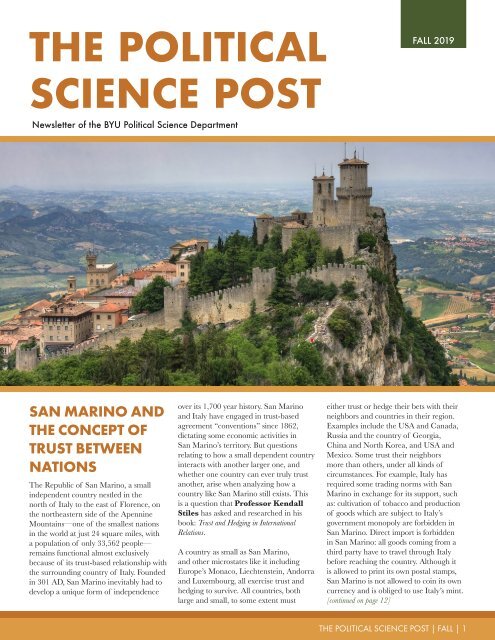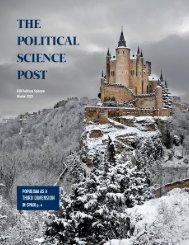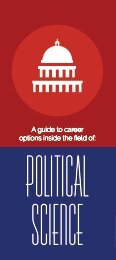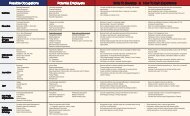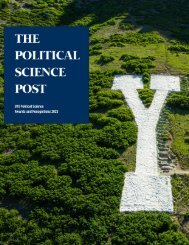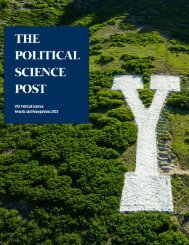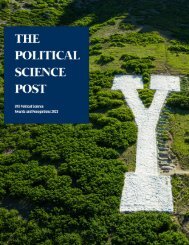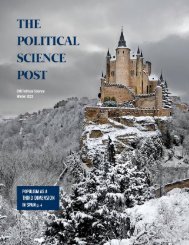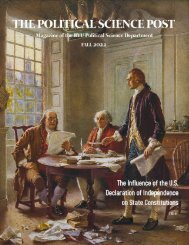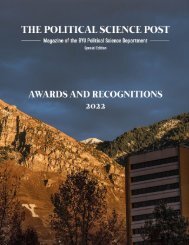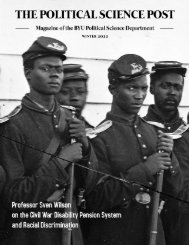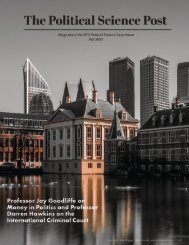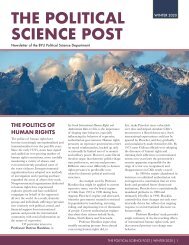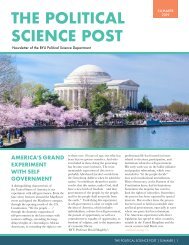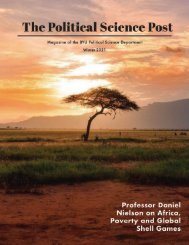You also want an ePaper? Increase the reach of your titles
YUMPU automatically turns print PDFs into web optimized ePapers that Google loves.
THE POLITICAL<br />
FALL 2019<br />
SCIENCE POST<br />
Newsletter of the BYU Political Science Department<br />
SAN MARINO AND<br />
THE CONCEPT OF<br />
TRUST BETWEEN<br />
NATIONS<br />
The Republic of San Marino, a small<br />
independent country nestled in the<br />
north of Italy to the east of Florence, on<br />
the northeastern side of the Apennine<br />
Mountains—one of the smallest nations<br />
in the world at just 24 square miles, with<br />
a population of only 33,562 people—<br />
remains functional almost exclusively<br />
because of its trust-based relationship with<br />
the surrounding country of Italy. Founded<br />
in 301 AD, San Marino inevitably had to<br />
develop a unique form of independence<br />
over its 1,700 year history. San Marino<br />
and Italy have engaged in trust-based<br />
agreement “conventions” since 1862,<br />
dictating some economic activities in<br />
San Marino’s territory. But questions<br />
relating to how a small dependent country<br />
interacts with another larger one, and<br />
whether one country can ever truly trust<br />
another, arise when analyzing how a<br />
country like San Marino still exists. This<br />
is a question that Professor Kendall<br />
Stiles has asked and researched in his<br />
book: Trust and Hedging in International<br />
Relations.<br />
A country as small as San Marino,<br />
and other microstates like it including<br />
Europe’s Monaco, Liechtenstein, Andorra<br />
and Luxembourg, all exercise trust and<br />
hedging to survive. All countries, both<br />
large and small, to some extent must<br />
either trust or hedge their bets with their<br />
neighbors and countries in their region.<br />
Examples include the USA and Canada,<br />
Russia and the country of Georgia,<br />
China and North Korea, and USA and<br />
Mexico. Some trust their neighbors<br />
more than others, under all kinds of<br />
circumstances. For example, Italy has<br />
required some trading norms with San<br />
Marino in exchange for its support, such<br />
as: cultivation of tobacco and production<br />
of goods which are subject to Italy’s<br />
government monopoly are forbidden in<br />
San Marino. Direct import is forbidden<br />
in San Marino: all goods coming from a<br />
third party have to travel through Italy<br />
before reaching the country. Although it<br />
is allowed to print its own postal stamps,<br />
San Marino is not allowed to coin its own<br />
currency and is obliged to use Italy’s mint.<br />
[continued on page 12]<br />
THE POLITICAL SCIENCE POST | FALL | 1
TABLE OF CONTENTS<br />
3<br />
6<br />
12<br />
13<br />
EVENTS &<br />
PROGRAMS<br />
Read about the recent events on and<br />
off BYU campus.<br />
PEOPLE<br />
Spotlights on students, professors,<br />
and alumni alike. Hear more about<br />
professor publications.<br />
POLITICS<br />
Read more on San Marino and the<br />
concept of trust between nations.<br />
ENGAGED<br />
LIVING<br />
Learn how to become more involved<br />
with the aims and mission behind<br />
BYU Political Science.<br />
The BYU Department of Political<br />
Science, consistent with the aims of<br />
a BYU education, intends to foster<br />
“Lifelong Learning and Service.”<br />
We hope to provide our alumni<br />
with intelligent, thoughtful and<br />
sophisticated analysis of important<br />
issues, and to act as a catalyst<br />
for service in our communities,<br />
neighborhoods, nations and the world.<br />
Connect with us on social media<br />
@BYUPAS<br />
BYU POLITICAL AFFAIRS SOCIETY<br />
@BYUPAS<br />
@BYUPOLITICALSCI<br />
BYUPOLITICALSCIENCEBLOG.COM<br />
BYU POLI SCI STORIES @YOUTUBE<br />
THE POLITICAL SCIENCE POST | FALL 2019 | 2
EVENTS &<br />
PROGRAMS<br />
BEYOND BYU 2019 ON MAY 9-10, 2019<br />
Beyond BYU is a career networking event, wherein students travel to Washington,<br />
DC and meet for two days in groups at career oriented events. They meet at the<br />
offices of various DC PAS Chapter members who work for trade organizations, law<br />
firms, political consulting boutiques, Congress, international relations groups, and<br />
many more to learn what makes D.C. tick. The keynote speaker, Judge Thomas<br />
Griffiths, 106 Senate Dirksen Building, Washington, DC, spoke about his career<br />
in law and in the US Court system, and gave advice to students on what qualities<br />
helped him succeed.<br />
LDS SCHOLARS WORKSHOP ON<br />
MAY 23-24, 2019<br />
The BYU Political Science Department hosted its fourth annual “LDS Scholars<br />
Workshop”. The motivation behind the workshop is to provide a venue for young<br />
LDS scholars to foster professional networks with other LDS scholars (junior and<br />
senior), as well as receive feedback on their work. Graduate students and newlyminted<br />
assistant professors were each assigned mentors from amongst the BYU<br />
faculty who helped them prepare for the conference, from proof-reading their paper,<br />
to advising them on how to give good discussant feedback, and giving them tips on<br />
presentation techniques. This year, we invited 30 participants to present their work<br />
over a two-day workshop. BYU faculty provided feedback and each session involved<br />
lively discussion amongst the participants.<br />
CSED CONFERENCE ON JUNE 6-7, 2019<br />
The 2019 CSED Conference (Center for the Study of Elections and Democracy), on<br />
“Partisanship Reconsidered,” was held on Thursday and Friday, June 6 and 7, 2019<br />
at BYU and at the Sundance Mountain Resort. In addition, a banquet honoring<br />
retiring Professor David Magleby was held at the Sundance Mountain Resort.<br />
PROVO PIONEER DAY PIE CONTEST ON JULY<br />
24, 2019<br />
Professor Ryan Davis won Third Place Honors in the Provo Pioneer Day Pie<br />
Contest, 2019, July 24, 2019 with his delicious Blue Berry with Raspberry/Vanilla<br />
Crème Pie. The Provo City Major Michelle Kaufusi encouraged him to continue!<br />
Congratulations Ryan!<br />
THE POLITICAL SCIENCE POST |SUMMER 2019 | 3<br />
THE POLITICAL SCIENCE POST | FALL 2019 | 3
POLITICAL SCIENCE DEPARTMENT CLOSING<br />
BANQUET HONORS<br />
Friday, April 12th, 2019<br />
RECOGNITIONS FOR<br />
NATIONAL POLITICAL<br />
SCIENCE HONOR SOCIETY<br />
The National Political Science Honor Society, is<br />
the only honor society for college and university<br />
students of political science in the United States. Its<br />
purpose is to recognize and promote high academic<br />
achievement in the field of political science.<br />
McKay Coppins spoke as the keynote speaker at<br />
the annual awards banquet and is an American<br />
journalist, author and staff writer for The Atlantic.<br />
Pi Sigma Alpha inductees:<br />
Diana Alarcon Natalee Jones<br />
Meghan Beatty Aidan Kassem<br />
Madeline Beck Erin Kitchens Wong<br />
Jamie Bjazevich Isabelle Lougee<br />
Joanna Burstedt Nathan McQuarrie<br />
Katrina Cole<br />
Evan Pinson<br />
Jennica Collette Jacob Price<br />
Elvira Correa Lazaro Aubrey Reed<br />
Patricia Franks Chloe Roblyer<br />
Jordan Gage<br />
Casey Roper<br />
Jason Gardiner Chelsea Rose<br />
Jacob Harris<br />
Amanda Solomon<br />
Naomi Hilton<br />
Samantha Tidwell<br />
Danielle Hogan Talley Timms<br />
Garrett Hostetter Colt Williams<br />
Amber Hutchinson Henry Wright<br />
Savanna Johnson<br />
Foreign Language Awards:<br />
Isabelle Loungee won the 2019 Foreign<br />
Language Award. This Language Certificate<br />
program has been completed by roughly a<br />
dozen polisci grads in each year.<br />
Poli Sci Stories Awards - Video of the Year:<br />
Amerins Tolman<br />
Department Awards:<br />
Sarah Allred<br />
Madeline Beck<br />
Gabe Darger<br />
Kelly Duncan<br />
Isabelle Lougee<br />
Matthew Easton<br />
Rachel Finlayson<br />
Samantha Frazier<br />
Elden Griggs<br />
Luke Lyman<br />
Connor Kreutz<br />
Braydon Madson<br />
Emmanuel Reyelts<br />
Alena Smith<br />
Jacob Spencer<br />
Brynne Townley<br />
Heather Walker<br />
Abigail Woodfield<br />
Aubriana Wolferts<br />
THE POLITICAL SCIENCE POST | FALL 2019 | 4
ACUNS<br />
Conference in<br />
Stellenbosch,<br />
South Africa<br />
BYU is hosting the ACUNS journal Global<br />
Governance under the direction of Co-Editor-In-<br />
Chief, BYU Political Science Professor Kendall<br />
Stiles, until 2023. This year the annual conference<br />
for ACUNS (the Academic Council of the United<br />
Nations System) took place at Stellenbosch University,<br />
in Stellenbosch, South Africa, just east of Cape Town.<br />
Several of the editorial staff of Global Governance<br />
attended the event, including Matthew Clarke,<br />
JUNE Managing 19-21, Editor 2019 of the Journal, from BYU Political<br />
Science, along with 175 other participants from 60<br />
different countries.<br />
Under discussion was the “UN and Africa:<br />
Progress Towards Achieving the SDGs.” SDGs are<br />
“Sustainable Development Goals” proposed by<br />
the United Nations General Assembly in 2015: a<br />
collection of 17 global goals to be achieved by the<br />
year 2030. The SDGs are part of Resolution 70/1 of<br />
the United Nations General Assembly: “Transforming<br />
our World: the 2030 Agenda for Sustainable<br />
Development.”<br />
Of particular interest to the journal of Global<br />
Governance was the annual “Holmes Lecture”<br />
presented this year by the Chair of the Law Faculty<br />
Trust for Social Justice at Stellenbosch University,<br />
Professor Thuli Madonsela, who was named among<br />
Time Magazine’s 100 most influential people in 2014,<br />
and Forbes recognized her as the African Person<br />
of the Year in 2016. She spoke about the two most<br />
pressing world imperatives now: Social Justice and<br />
Climate Change. Particularly, she focused on Social<br />
Justice where SDG goals include reducing inequality<br />
with inclusive and sustainable economic growth and<br />
decent work for all; reducing Gender Inequality in<br />
a world of universal respect for human rights and<br />
human dignity, the rule of law, justice, equality and<br />
non-discrimination; of respect for race, ethnicity<br />
and cultural diversity; and to eliminate “poverty” by<br />
2030. Her concerns now are that in Africa, 70% of<br />
the assets of South Africa are owned by 10% of the<br />
richest people, and that 55% of all groups are poor.<br />
She gave an inspiring presentation, which will be<br />
published in Global Governance early in 2020.<br />
Please take a moment and look into this fascinating<br />
United Nations journal hosted by BYU Political<br />
Science. (https://brill.com/view/journals/gg/ggoverview.xml?lang=en)<br />
THE POLITICAL SCIENCE POST |SUMMER 2019 | 3<br />
THE POLITICAL SCIENCE POST | FALL 2019 | 5
Political Philosopher<br />
NICOLO MACHIAVELLI<br />
Niccolò di Bernardo dei Machiavelli (3 May 1469 – 21 June 1527) was an Italian<br />
diplomat, politician, historian, philosopher, humanist, writer, playwright and poet<br />
of the Renaissance period. Born in Florence, he has often been called the father of<br />
modern political philosophy and political science. For many years he served as a senior<br />
official in the Florentine Republic with responsibilities in diplomatic and military<br />
affairs. He wrote comedies, carnival songs, and poetry. His personal correspondence is<br />
renowned by historians and scholars. He worked as secretary to the Second Chancery<br />
of the Republic of Florence from 1498 to 1512, when the Medici were out of power.<br />
He wrote his best-known work The Prince (Il Principe) in 1513, having been exiled<br />
from city affairs.<br />
Machiavellian is widely used as a pejorative to characterize unscrupulous politicians<br />
of the sort Machiavelli advised most famously in The Prince. Machiavelli described<br />
immoral behavior, such as dishonesty and the killing of innocents, as being normal<br />
and effective in politics. He even encouraged it in many situations. The book gained<br />
notoriety due to claims that it teaches “evil recommendations to tyrants to help them<br />
maintain their power”.<br />
The term Machiavellian often connotes political deceit, deviousness, and realpolitik.<br />
On the other hand, many commentators, such as Baruch Spinoza, Jean-Jacques<br />
Rousseau and Denis Diderot, have argued that Machiavelli was more of a republican,<br />
even when writing The Prince, and his writings gave inspiration to Enlightenment<br />
A map of Florence<br />
proponents of modern democratic political philosophy. His much less popular work,<br />
the Discourses on Livy, is often said to have paved the way of modern republicanism.<br />
Machiavelli is sometimes seen as the prototype of a modern empirical scientist,<br />
building generalizations from experience and historical facts, and emphasizing<br />
the uselessness of theorizing with the imagination. “He emancipated politics from<br />
theology and moral philosophy. He undertook to describe simply what rulers actually<br />
did and thus anticipated what was later called the scientific spirit in which questions<br />
of good and bad are ignored, and the observer attempts to discover only what really<br />
happens, wrote Joshua Kaplan in 2005.<br />
Machiavelli felt that his early schooling along the lines of a traditional classical<br />
education was essentially useless for the purpose of understanding politics.<br />
Nevertheless, he advocated intensive study of the past, particularly regarding the<br />
founding of a city, which he felt was a key to understanding its later development.<br />
Moreover, he studied the way people lived and aimed to inform leaders how they<br />
should rule and even how they themselves should live. Machiavelli denies the classical<br />
opinion that living virtuously always leads to happiness.<br />
[Source: (https://bit.ly/1Yhkoe4) See also: The Essential Writings of Machiavelli (Modern Library Classics) – April 3, 2007 by Niccolo<br />
Machiavelli (Author), Peter Constantine (Translator), Albert Russell Ascoli (Introduction)<br />
THE POLITICAL SCIENCE POST | FALL 2019| 6
ALUMNI<br />
STUDENT<br />
SAVANNAH ECCLES<br />
JOHNSTON<br />
Savannah Eccles Johnston is a<br />
PHD Candidate at Claremont<br />
University after a BA at BYU in<br />
Political Science. Her Dissertation<br />
is on Traditionalist Conservatism<br />
and Classical Liberalism, and<br />
the Fusion Era of Conservatism<br />
(1955-1990) versus the<br />
Contemporary Era (1991-2019).<br />
RICHARD HARTVISGEN<br />
Richard Hartvisgen graduated<br />
from BYU in Political Science and<br />
received his law degree from the<br />
J. Reuben Clark Law School. He<br />
has been with Nuskin International<br />
for over 30 years, and has worked<br />
there as General Council, Director<br />
of Legal Affairs, Head of Strategic<br />
Planning, and is currently VP of<br />
Global Regulatory Affairs and<br />
General Counsel International.<br />
KENNEDY GERRATT<br />
Kennedy Gerratt is a junior<br />
majoring in Political Science.<br />
She grew up all over the east<br />
coast and moved around<br />
every few years. Her interest<br />
in politics was first sparked<br />
when her family moved to<br />
New Jersey and she spent all<br />
her free time going to DC,<br />
Boston, Philadelphia, and other<br />
historical cities learning about our country’s founding. She<br />
loves studying American politics, specifically campaigns<br />
and elections. She’s hoping to attend law school after<br />
graduation and eventually end up managing campaigns.<br />
She really enjoys being a part of the Political Affairs<br />
Society because it helps connect the students at BYU to<br />
faculty and other students who are interested in politics.<br />
SPOTLIGHTS<br />
ERIK KRISLE<br />
Erik Krisle is a director based<br />
in Salt Lake City. In this role,<br />
Erik manages Leavitt Partners’<br />
data and analytics team. Mr.<br />
Krisle also manages primary data<br />
collection efforts and data asset<br />
management efforts. He also<br />
participates in the firm’s study of<br />
geographic variation in health<br />
care markets. Prior to joining<br />
Leavitt Partners, Erik founded and<br />
operated a boutique data analytics<br />
consulting firm specializing in survey research and sophisticated<br />
statistical and economic modeling for private and public sector<br />
clients. There he organized a team of experienced analysts<br />
and academics to consult on a variety of data collection and<br />
interpretation projects including a state-based economic impact<br />
model and evaluation tool for health care reform initiatives.<br />
Erik received his master’s degree in public policy and bachelor’s<br />
degree in political science from Brigham Young University.<br />
JAKE JENSEN<br />
Jake Jensen is a senior and<br />
President of the Political<br />
Affairs Society at BYU. He has<br />
pursued a legal studies track<br />
as a Political Science major<br />
and hopes to attend law school<br />
following graduation in April.<br />
Jake spent the summer of 2019<br />
interning with a lobbying firm<br />
in Alexandria, VA, where he<br />
learned about special interests and the legislative process.<br />
He enjoys connecting with other students and spending time<br />
with his wife, Sophia.<br />
THE POLITICAL SCIENCE POST | FALL 2019 | 7
FACULTY SPOTLIGHT<br />
Kendall Stiles was born in Akron, Ohio and his family moved to a little<br />
village in Normandy, France called Lillebonne when he was eleven<br />
years old. The quaint village was located on the Seine River near the<br />
river’s confluence with the English Channel and is where William the<br />
Conqueror gathered his armies prior to Norman invasion in 1066.<br />
There, for six years, Ken gained a view of foreign policy from a French<br />
perspective and it has influenced his life profoundly.<br />
And he was converted to the Church of Jesus Christ of Latter-day<br />
Saints there in France. His older brother had been at an American<br />
School in Paris, and had met a Mormon girl there who converted him.<br />
Then he converted Ken, who subsequently converted his mother. At<br />
14, Ken was already convinced that the Church was true, even though<br />
their branch in Le Havre was tiny, only 15 to 20 members. Mormons<br />
had filled in the blanks on theology where Catholics and Protestants<br />
could not. He felt he was swimming in familiar waters with members<br />
of the Church. After his French Lycee high school experience he went<br />
early to BYU and experienced culture shock at the number of people<br />
who were members of the church. He was not a cultural Mormon and<br />
had to learn some of the social norms.<br />
At BYU he became an IR major and studied with Stan Taylor, served<br />
a mission to Australia, then pursued a Masters in Political Science at<br />
BYU under Earl Frye, Lad Hollister and Lamond Tullis. He learned<br />
Marxism after Marx from David Bohn. He also studied with David<br />
Magleby. Ken pursued his doctorate in Political Science at Johns<br />
Hopkins University in Baltimore, Maryland and received his Ph.D. in<br />
1987 with a dissertation on “Bargaining and Decision-making in the<br />
IMF (published by Westview, 1991).” He met his wife during graduate<br />
school in Baltimore. They both sang in the regional church choir and<br />
it was almost love at first sight. She was from Northern Virginia and<br />
they dated only 2-3 months before getting married in the DC Temple.<br />
After graduate school, Ken worked at the CIA as an analyst, then<br />
taught for six years at Bowling Green State University, then at Loyola<br />
in northern Chicago. He was ten years at Loyola and researched<br />
international law, specifically in Bangladesh. After Loyola, Ken and<br />
his family moved west to BYU in September 2003. They lived in<br />
Orem for 11 years, then moved from Orem to their beautiful home in<br />
Hobble Creek Canyon in December 2014 where they have a beautiful<br />
neighborhood, and where 200 wild turkey roam, along with cougars,<br />
coyotes, moose, elk and deer. His favorite French food is onion soup<br />
with a baquette, and eclairs and Napoleons for desert. Currently he<br />
is the co-Editor in Chief of a journal sponsored by the Academic<br />
Council of the United Nations System called Global Governance.<br />
He was the Director of the BYU International Relations Program,<br />
2011-2014 and Associate Chair for Curriculum, BYU Political Science<br />
Department, 2009-2011.<br />
KENDALL<br />
STILES<br />
Ph.D in Political Science at<br />
Johns Hopkins University<br />
THE POLITICAL THE POLITICAL SCIENCE SCIENCE POST | POST SUMMER | FALL 2019| | 12 7<br />
8
FACULTY SPOTLIGHT<br />
Lucy Williams grew up skiing, hiking, and biking in the mountains<br />
of Park City, Utah. In high school, she reluctantly took a half-year<br />
Government class that was required for graduation. The course<br />
quickly became her favorite subject in school, and by the time it<br />
was over, she was determined to become a political scientist. Lucy’s<br />
parents sensed her newfound passion, and for Christmas that year<br />
they gave her an “essential reading for political scientists” book<br />
collection, which included books like J.S. Mill’s’ “On Liberty” and<br />
other classic texts in political thought. It was Lucy’s first exposure<br />
to political theory, and she never looked back.<br />
Lucy earned a bachelor’s degree in Political Science at the<br />
University of Utah, where she took every political theory course<br />
listed in the course catalog. She then continued her political theory<br />
training at UCLA, where she earned a PhD in Political Science.<br />
To supplement her theoretical education, Lucy also pursued a JD<br />
at the UCLA School of Law. She loved both fields of study and<br />
enjoyed exploring how abstract theoretical ideas are applied and<br />
put into practice through law.<br />
During graduate school, Lucy took up cycling and running. She<br />
now loves to work through writer’s block by going on long runs or<br />
climbing hills on her bike. She also loves to karaoke (though she is<br />
not a particularly good singer). On one memorable occasion, she<br />
brought the house down with a rousing performance of the Village<br />
People’s “YMCA.”<br />
Lucy joined the BYU Political Science faculty in Fall of 2018. She<br />
is currently on a leave of absence to complete a one-year clerkship<br />
on the Tenth Circuit Court of Appeals. She is excited to return to<br />
her BYU teaching and research in January 2020.<br />
LUCY<br />
WILLIAMS<br />
Ph.D in Political Science at UCLA<br />
JD at UCLA School of Law<br />
THE POLITICAL THE POLITICAL SCIENCE SCIENCE POST | POST SUMMER | FALL 2019| | 12 78<br />
9
FACULTY PUBLICATIONS<br />
State Responses to International Law<br />
KENDALL STILES<br />
Do countries keep their promises to the international community? When they sign treaties or learn<br />
about new expectations, do they take them seriously and implement them? Since we already know<br />
intuitively that not all countries do, the next question and the topic of this book is: who complies?<br />
By considering a wide range of different rules each precise enough to allow one to measure state<br />
compliance and a variety of methods, we hope to answer this question once and for all.<br />
The Ideational Approach to Populism<br />
KIRK HAWKINS<br />
Populism is on the rise in Europe and the Americas. Scholars increasingly understand populist<br />
forces in terms of their ideas or discourse, one that envisions a cosmic struggle between the will<br />
of the common people and a conspiring elite. In this volume, we advance populism scholarship<br />
by proposing a causal theory and methodological guidelines – a research program – based on this<br />
ideational approach. This program argues that populism exists as a set of widespread attitudes<br />
among ordinary citizens, and that these attitudes lie dormant until activated by weak democratic<br />
governance and policy failure. It offers methodological guidelines for scholars seeking to measure<br />
populist ideas and test their effects. And, to ground the program empirically, it tests this theory<br />
at multiple levels of analysis using original data on populist discourse across European and US<br />
party systems; case studies of populist forces in Europe, Latin America, and the US; survey data<br />
from Europe and Latin America; and experiments in Chile, the US, and the UK. The result is a<br />
truly systematic, comparative approach that helps answer questions about the causes and effects<br />
of populism.<br />
Contemporary US Populism in Comparative Perspective<br />
KIRK HAWKINS, BRIGHAM YOUNG UNIVERSITY, UTAH; LEVENTE LITTVAY,<br />
CENTRAL EUROPEAN UNIVERSITY, BUDAPEST<br />
With the victory of Donald Trump in the 2016 United States presidential election, populists<br />
have come to power in the US for the first time in many years. However, US political scientists<br />
have been flat-footed in their response, failing to anticipate or measure populism’s impact<br />
on the campaign or to offer useful policy responses. In contrast, populism has long been an<br />
important topic of study for political scientists studying other regions, especially Latin America<br />
and Europe. The conceptual and theoretical insights of comparativist scholars can benefit<br />
Americanists, and applying their techniques can help US scholars and policymakers place<br />
events in perspective.<br />
THE POLITICAL SCIENCE POST | SUMMER 2019 | 13<br />
THE POLITICAL SCIENCE POST | FALL 2019| 10
FACULTY IN THE NEWS<br />
Announcements<br />
CONGRATULATIONS<br />
Congratulations to Professors Jay Goodliffe and Kirk Hawkins who were<br />
recently promoted to full professor, and to Professor Chad Nelson, who was<br />
recently promoted to candidacy for CFS (continuing faculty status)!<br />
BYU MAGAZINE FEATURE<br />
Kirk Hawkins’ work on Populism was highlighted in the current issue of BYU<br />
Magazine, in the “News Seciton”: “A Populism Primer,” by Kristen L. Evans<br />
(BA ’19).<br />
FEATURED IN THE POST<br />
Our very own Professor Ryan Davis co-authored an article in the Washington<br />
Post on July 19, 2019 on “Facts straight from Mueller’s Mouth.” The article<br />
suggests that it’s almost impossible to change minds once the capacity to<br />
reason has been surrendered.<br />
See the article in full here: https://wapo.st/30NJvKR<br />
Julie Rose’s Top of Mind<br />
MAY 14, 2019<br />
Chris Karpowitz and Grant Madsen had a great segment on “Top of Mind”<br />
May 14, 2019 about the power struggle between Congress and the White<br />
House! Here’s the link to the podcast: https://bit.ly/32FRRFc<br />
JULY 8, 2019<br />
Chris and Grant had another great conversation on Top of Mind, July 8, 2019.<br />
Here’s the link to the discussion on the presidential election with 2 Democrats<br />
trying to unseat President Trump. Listen to it here: https://bit.ly/2KarBwd<br />
SEPTEMBER 17, 2019<br />
Chris Karpowitz had a great chat about the American Family Survey on “Top of<br />
Mind” on September 17, 2019! Here’s the link: https://bit.ly/32Ep587<br />
THE POLITICAL SCIENCE POST | FALL 2019 | 11
SAN MARINO AND THE CONCEPT<br />
OF TRUST BETWEEN NATIONS<br />
[continued from page 1]<br />
But the agreement does not affect the right<br />
of the Republic of San Marino to<br />
continue to issue gold coins denominated in<br />
Scudi (legal value of 1 gold Scudo is 37.50<br />
euros). Gambling is legal and regulated<br />
starting in 2007. There is currently one<br />
legally operating casino in San Marino.<br />
In exchange for these limitations, Italy<br />
provides San Marino with an annual<br />
stipend, and at cost, sea salt (not more<br />
than 250 tonnes per year), tobacco<br />
(40 tonnes), cigarettes (20 tonnes) and<br />
matches (unlimited). At the border there<br />
are no formalities with Italy. However,<br />
at the tourist office visitors can purchase<br />
officially cancelled souvenir stamps for<br />
their passports. Under these restrictions,<br />
San Marino is thriving. Italy and tiny<br />
San Marino have a relationship of trust<br />
and cooperation. While most agree that<br />
global cooperation is desirable, and that<br />
trust between nations large and small is<br />
critical to ensure a world that is safe and<br />
productive, fear of being exploited usually<br />
takes precedence.<br />
Current opposition to free trade on both<br />
sides of the Atlantic, for example, stems<br />
largely from the sense that countries are<br />
being exploited. The U.S. currently feels<br />
it’s being exploited by China. Despite<br />
this, trust is real between countries and<br />
plays a key role in international relations.<br />
Professor Stiles writes extensively about<br />
the notion of trust and suggests that where<br />
it does exist, it emerges from a confluence<br />
of strategic, social, and ideational factors.<br />
But those countries who do not trust<br />
others, are not necessarily on a path that<br />
undermines international cooperation and<br />
solidarity. (pp. 1-2, Trust and Hedging in<br />
International Relations, Stiles). Again, the<br />
U.S. does not trust China or Russia, but<br />
the two countries still have broad areas of<br />
agreement where cooperation exists.<br />
Looking at how relationships between<br />
European microstates and their partners<br />
have evolved over the past few centuries,<br />
Stiles finds that rather than trusting,<br />
most microstates are careful to hedge<br />
in their relations by agreeing only to<br />
arrangements that provide them with<br />
opt-out clauses, heavy involvement in joint<br />
decision-making, and sunset provisions.<br />
In the process, Stiles assesses the role of<br />
rationality, social relations, identity politics,<br />
and other theories of trust to demonstrate<br />
that trust is neither essential for cooperation<br />
nor a guarantee of protection and safety.<br />
Finally, he explores the ethical implications<br />
of a foreign policy founded on trust—in<br />
particular whether heads of state have the<br />
right to enter into open-ended agreements<br />
that put their citizens at risk.<br />
Stiles begins his analysis by developing<br />
a multidimensional definition and<br />
operationalization of trust that he relates<br />
to international law, international conflict,<br />
trade, and realism, liberalism, and<br />
constructivism. He follows this with an<br />
imaginative research design that explores<br />
the trust found in the associations between<br />
smaller and larger states, focusing first upon<br />
European microstates and then on the<br />
relationships between the United States,<br />
Russia, and China and several countries<br />
that have relied on these dominant<br />
members of the international system.<br />
Stiles examines the role such international<br />
institutions as the European Union, the<br />
Organization for Economic Cooperation<br />
and Development, and the United Nations<br />
play in building trust and providing<br />
smaller countries with a hedge against<br />
the adverse effects of an over reliance on<br />
more powerful actors. In a world where<br />
trust between nations clearly benefits all by<br />
enhancing trade and goodwill, hedging and<br />
strategic thinking are always critical.<br />
THE POLITICAL SCIENCE POST | FALL 2019 | 12
ENGAGED<br />
LIVING<br />
Serving our communities<br />
and country can bring<br />
fulfillment and can easily be<br />
part of a well-rounded life.<br />
Take advantage of the local<br />
and national opportunities<br />
to serve. Local BYU Political<br />
Science Alumni Chapters,<br />
such as those in New York<br />
City, Washington, DC, and<br />
in the Bay Area can help<br />
assist in the desire<br />
to serve.<br />
FACULTY QUOTE<br />
“From the perspective of the Nephites, remembrance included active<br />
participation in some form. For them it meant recalling not merely or<br />
simply with the mind but also with the heart . . . The Book of Mormon links<br />
remembrance with covenants and their renewals. Remembering means to keep<br />
the terms of the covenant between God and His people; it is faithful response to<br />
God’s commandments. At the same time, strictly keeping the commandments<br />
leads to remembering . . . Genuine memory or remembrance occurs in the faithful<br />
response to God’s covenant with Israel to make them His people. The Book<br />
of Mormon is not a secular but a covenant history, that is, one written from<br />
the perspective of the promised blessings for keeping the commandments. . .<br />
According to the Book of Mormon, God is carrying out a plan that includes the<br />
testing of his people—they are on probation. . . they must trust God and repent;<br />
they must remember and keep the commandments. . . The close links between<br />
thought and action can be seen in the way in which remembering in the Book of<br />
Mormon is linked to the heart of man.”<br />
-Louis Midgley,<br />
Professor Emeritus, BYU Political Science<br />
“To Remember and Keep”: On the Book of Mormon as an Ancient Book. In The<br />
Disciple las Scholar: Essays on Scripture and The Ancient World in Honor of Richard<br />
Lloyd Anderson. Chapter 4. Provo, Utah. The Foundation for Ancient Research and<br />
Mormon Studies, ed. Stephen D. Ricks, et al., 2000, 95-137.<br />
THE POLITICAL SCIENCE POST | FALL 2019 | 13


